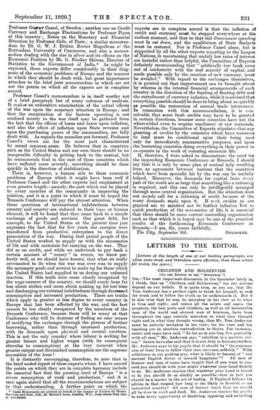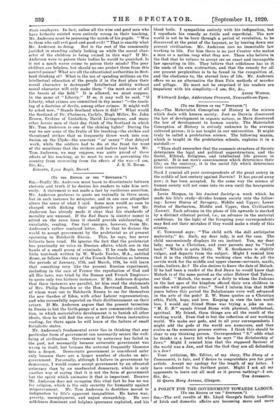LETTERS TO THE EDITOR.
[Letters of the length of one of our leading paragraphs are often more read, and therefore more effective, than those which fill treble the space.] CHILDREN AND BOLSHEVISM.
LTo THE EDITOR ON THE SPECTATOR."1 Sm,—The most important discussion in the Spectator lately is, I think, that on " Children and Bolshevism," for our actions depend on our beliefs. It is quite true, as you say, that Mr. Tom Anderson has a perfect right to think for himself, to seek for truth and to follow the truth as he understands it. But it Is also true that he may be mistaken in his view as to what is true and right; and unless all the saints and sages, the prophets, the best poets and thinkers, as well as all honourable men of the world and shrewd men of business, have been throughout the ages entirely mistaken in what they thought right and in what they thought wrong, then Mr. Tom Anderson must be entirely mistaken in his view; for his view and his teaching are in absolute contradiction to theirs. For instance, saints and sages have said, " So far as in you lies, live peaceably with all men." Mr. Anderson says " rebellion is a positive vir- tue." Saints have also said that it is our duty to loveoneanother. Mr. Anderson says to his pupils that it should be " the supreme aim of their lives to follow their own interests selfishly." With selfishness as our guiding star, what is likely to become of " our ancient English dower of inward happiness"? All men of honour and men of sense have taught that if you want to suc- ceed. you should do with your might whatever your hand findeth to do. Mr. Anderson teaches that whatever your hand is forced to do you should do as slackly as possible—that in fact you should be a master in the art of loafing. If England follows his advice is that respect how long is she likely to flourish as an industrial country? All men of honour teach that we should all be true in word and deed. Mr. Anderson teaches his pupils to take every opportunity of deceiving, opposing and swindling their employers. In fact, unless all the wise and good men who have hitherto existed were entirely wrong in their teaching, Mr. Anderson must be poisoning the minds of his pupils. " Woe to them who call evil good and good evil! " That is exactly what Mr. Anderson is- doing. But is the rest of the community justified in standing calmly looking on while the moral char- acter of the children is being ruined in this way? If Mr. Anderson were to poison their bodies he would be punished. Is it not a much worse crime to poison their minds? The poor children are helpless, but should no one protect them from this mental poison? What are all the educational authorities in Scot- land thinking of? What is the use of spending millions on the intellectual education of the people if in the first place their moral character is destroyed? Intellectual ability without moral character will only make them " the most acute of all the beasts of the field." It is allowed, we must suppose, in the name of "Liberty." If so, it may well be said, "0 Liberty, what crimes are committed in thy name! "—the teach- ing of a doctrine of devils, among other crimes. It might well be asked now, " Stands Scotland where it did?" What would the Scotland of Dr. Chalmers, Carlyle, Hugh Miller, Dr. John Brown, Erskine of Linlathen, David Livingstone, and many other heroic men of their day think of the Scotland in which Mr. Tom Anderson is one of the shining lights? During the war we saw some of the fruits of his teaching—the strikes and threatened strikes that so frequently threw work into con- fusion on the Clyde—the constant " ca' canny " that delayed work, while the soldiers had to die at the front for want of the munitions that the strikers and loafers kept back. Mr. Tom Anderson, we may suppose, was quite proud of these effects of his teaching, as he must be now in preventing the country from recovering from the effects of the war.—I am,



































 Previous page
Previous page